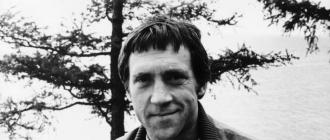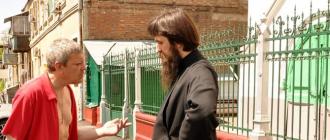This picture has been circulating on the Internet for several years now. Its author is trying to make Vladimir Vysotsky into a kind of Stalinist. Well, of course, a popularly beloved bard cannot help but love a leader revered by most of the people. And Internet users are happy to share this picture on their blogs: “Vysotsky wrote THIS, but YOU expected something different?!”
Vysotsky’s friend V. Akimov recalls those days: “It was considered a special valor among the guys to go into the Hall of Columns. Volodya and I were twice - through all the cordons, sometimes begging, sometimes cunningly; on roofs, along attics, fire escapes; in other people’s apartments, with back entrances to other streets or into courtyards; under the trucks; under the bellies of the horses; up and down again, getting out of all sorts of troubles, we made our way, climbed, ran, dived, jumped, crawled. And so we said goodbye to the leader.
Probably from the impression of farewell to the leader, Volodya Vysotsky was born this poem:
My oath
Belted with mourning ribbons,
Moscow fell into silence,
Her grief for the leader is deep,
My heart is filled with pain and melancholy.
I'm walking among a stream of people
Grief has frozen my heart,
I'm going to take a quick look
To the leader of a dear person...
A terrible fire burns my eyes,
And I don’t believe in black misfortune,
An incessant groan presses on my chest,
The heart cries for the wise leader.
The funeral march is pouring out,
Violins groan and hearts groan,
I swear at the grave not to forget
Dear leader and father.
I swear: I will keep up
With a friendly, strong and brotherly family,
I will carry a bright banner,
What did you give us, dear Stalin.
In these sorrowful and difficult days
I swear at your grave
Do not spare your young people your strength
For my great Fatherland.
The name Stalin will live for centuries,
It will soar over the earth,
The name Stalin will shine on us
The eternal sun and the eternal star.
They say that this poem was even published in some newspaper, but there is no exact information on this matter. It is even included in the collected works of V. Vysotsky, although I was always curious whether the author would have included it during his lifetime.
But time passed, and the enthusiastic love for the “father of nations” gave way to feelings that were exactly the opposite. Biographers of Vysotsky believe that he, they say, grew up and learned the “terrible truth.” But in my opinion, everything is much simpler: the future bard grew up in certain circles of the Moscow intelligentsia, where Stalin was hated with fierce hatred even by those who were spared the repressions of '37.
Obviously this left its mark on the poet’s worldview. And completely different poems began to be born.
For example, in the poem "Sauna in white", where there are these lines:
......................................
How much faith has fallen into the forest,
How many sorrows and paths have been experienced!
And on the left chest is Stalin’s profile,
And on the right is Marinka's full face.
..............................
I remember how early in the morning
He managed to shout to his brother: “Help!” -
And me two beautiful guards
They were taken from Siberia to Siberia.
And then, whether in a quarry or in a swamp,
Having swallowed tears and raw food,
We pricked profiles closer to the heart,
So that he can hear hearts breaking.
......................................
In the song it is not entirely clear (or rather, it is not at all clear) for what sins the hero of the song was imprisoned, but, according to conversations, recidivist criminals gave themselves tattoos with Lenin and Stalin. There was a legend among them that if they were sentenced to death, the security officers would not shoot at their leaders.
There is an even lesser-known song about deported Chechens, which ends with these lines:
And those who encouraged us to do great deeds,
They have been lying and writhing in a coffin for a long time, -
They were all taken there in a car,
And the most important thing - went down the drain
I think it’s not difficult to guess who this “most important” person is....
Vladimir Semenovich did not disdain “suits from someone else’s shoulder.” Yuz Aleshkovsky's song "Comrade Stalin" was performed so often by Vysotsky that he is credited with the authorship. Everyone has probably heard:
Comrade Stalin, you are a great scientist,
You know a lot about linguistics,
And I'm a simple Soviet prisoner,
And my comrade is the gray Bryansk wolf.
True, Yuz Aleshkovsky, now living in the United States, was neither a Marxist nor a “left deviationist,” but received his four years under Stalin for a criminal offense....
They say that Vysotsky and Marina Vladi had a chance to attend the same holiday in Georgia. There were a lot of people, a lot of wine, a lot of toasts. Vysotsky was known very well there. When the toast sounded: to a comrade. Stalin, Vysotsky defiantly poured out his glass.
It’s true that this story doesn’t seem entirely reliable to me: it’s unlikely that Vysotsky would have decided on such a stunt in Georgia. Much closer to the truth is the story of Marina Vladi from the book “Interrupted Flight”:
The feast continues. The hall is noisy and fun. Suddenly one of the guests loudly
asks:
- Will we forget to drink to our great Stalin?
An uncomfortable silence reigns at the table. The Georgian intelligentsia suffered severely under Stalin, and while some people regard him with nostalgic admiration, the owner of the house, like ourselves, considers him a real criminal.
I take your hand and quietly ask you not to make a scandal. You turned pale and looked at that man with white eyes of rage. The host solemnly takes the horn from the guest's hands and slowly drinks it. And a strong male voice suddenly cuts through the silence, and a harmonious choir joins behind it. With singing, precise and rare polyphony, these people respond to the mention of the cursed years: voices merge into sonorous and passionate music, affirming contempt for the tyrant, the harmony of the melody reflects the harmony of thoughts. Thanks to the innate tact of these people, a random guest did not manage to spoil our holiday, and we are still sitting at the table when the rooster begins to crow in the yard.
True, it seems to me that the universal hatred of the “tyrant” and “damned times” in Georgia is the fantasy of the imagination of the poet’s wife, inflamed by anti-Sovietism, but oh well...
By the way, Vysotsky himself also celebrated this episode with a song:
...........................
Let him talk a lot of nonsense
Our toastmaster - don’t touch the toastmaster -
There was a toast to the Motherland,
For Stalin, I thought, I’m at the front.
And now no one eats at the table
And the toastmaster reigns as sheriff over everything, -
As if the twentieth-odd congress
The other - the twentieth - declares it a myth.
The toastmaster drank outside the city, outside the village
And he praised everyone frantically, -
However, he never hiccupped -
And I gained respect for him.
True, I was with the toastmaster
Long toast alaverda
For him - the leader of the peoples,
And for all his work.
The toastmaster told me that I am a native,
What if I feel bad - he can’t sleep -
Then he asked me: “Who are you?”
And I said: “A bandit and a bloodsucker.”
..................................
And one more final touch to the topic “Vysotsky and Stalin”:
The famous Polish actor D. Olbrychski, who knew Vysotsky well, recalls an interesting episode in one of his books. One day, Vysotsky was driving him and other Polish actors around the Moscow region. The path ran past Stalin's dacha. “Stalin died here,” Volodya said. “Stalin died at this dacha,” I translated. “You translate properly!” Vysotsky exploded. “I said: I'm dead!"
I think comments are unnecessary...
P.S. The author in no way wanted to denigrate the wonderful actor and bard Vladimir Semenovich Vysotsky, who wrote many wonderful songs, in particular about the Great Patriotic War. The author simply does not like the attempts of some patriots to make Vysotsky a kind of Stalinist. The author does not even accuse the poet himself of anti-Stalinism. It’s just that friends, who later became famous anti-Soviet liberals, and a foreign wife, who is considered Russian, but in fact is an anti-Soviet Russophobe, exerted their influence. The result is what happened.
The first poem by Vladimir Vysotsky, written by him in 1953, was dedicated to I.V. Stalin
There were many rumors and legends around the name of the famous poet V. Vysotsky, because it was difficult for viewers and listeners to believe that he himself never fought, did not fly into space, was not a miner, was not in prison - after all, everything about No matter how he sang, it was so convincing, as if the author had experienced it all himself.
Vysotsky survived the Great Patriotic War as a child at the age of 3-6 years and remembered a lot about the events of this time from the stories of his father and his friends. For him, the war and the inspirer of Victory in it, Stalin, is the time that most clearly demonstrates the character of the Soviet people and the guiding will of its leader.
As soon as Stalin passed away, Vysotsky wrote a song about him. I created it with my heart, with all my conscience. This is how the poem “My Oath” was born:
Belted with mourning ribbons,
Moscow fell into silence,
Her grief for the leader is deep,
My heart is filled with pain and melancholy.
I'm walking among a stream of people
Grief has frozen my heart,
I'm going to take a quick look
To the leader of a dear person...
A terrible fire burns my eyes,
And I don’t believe in black misfortune,
An incessant groan presses on my chest,
The heart cries for the wise leader.
The funeral march is pouring out,
Violins groan and hearts groan,
I swear at the grave not to forget
Dear leader and father.
I swear: I will keep up
With a friendly, strong and brotherly family,
I will carry a bright banner,
What did you give us, dear Stalin.
In these sorrowful and difficult days
I swear at your grave
Do not spare your young people your strength
For my great Fatherland.
The name Stalin will live for centuries,
It will soar over the earth,
The name Stalin will shine on us
Eternal sun and eternal star
Only on March 8, 1953, eighth-grader Volodya Vysotsky, walking past the coffin with the body of the late I.V. Stalin, returned home and wrote the poem “My Oath.” It was preserved thanks to the fact that Volodya’s mother Nina Maksimovna published it in the wall newspaper of the institution where she worked.

Many years later, Vysotsky’s friend V. Akimov recalled:
“It was considered special valor among the guys to go to the Hall of Columns. Volodya and I were twice - through all the cordons, sometimes begging, sometimes cunning; on roofs, attics, fire escapes; to other people's apartments, with back entrances to other streets or courtyards; under trucks; under the bellies of horses; again up and down, getting out of various troubles, we made our way, made our way, crawled through, ran, dived, jumped, crawled. So we said goodbye to the leader.”
Zhiltsov does not provide any more information, which is a pity. It is known that Vysotsky almost never reprinted his texts even in his mature years, not to mention the poems written in school. The fact that “My Oath” was published can, in my opinion, indicate only one thing - the poem was intended for publication. Of course, it may turn out that it was published only in the school wall newspaper, but publication in periodicals cannot be ruled out (in those days a lot of similar poems were published in a variety of publications).

During his lifetime, little was written about Vysotsky (he died in 1980), but now critics recall: “When he sang or played, it always seemed like some kind of battle was going on. In this voice one could hear the clanging of metal, the grinding of brakes, the solemn sound of a trumpet and the dying groan - everything in this battle sounds around the person and inside him. This super-intense, incessant work on oneself was Vysotsky’s main secret.”
Over the course of 20 years, Vysotsky wrote more than six hundred songs alone. One of them contains prophetic words:
A little slower horses, a little slower!
I beg you, don’t jump and fly!
But somehow the horses I got were finicky.
If you didn’t have time to live, at least finish singing!
Suffering for people, just as it once did for leader Stalin, was the main thing in his work. It is with suffering that Vysotsky’s early, very personal poem “My Oath” is filled.
Vladimir Vysotsky. “My oath” by Vladimir Vysotsky The very first poem by Vladimir Vysotsky. Written in eighth grade, March 8, 1953, on the death of I.V. Stalin.
Belted with mourning ribbons,
Moscow fell into silence,
Her grief for the leader is deep,
My heart is filled with pain and melancholy.
I'm walking among a stream of people
Grief has frozen my heart,
I'm going to take a quick look
To the leader of a dear person...
A terrible fire burns my eyes,
And I don’t believe in black misfortune,
An incessant groan presses on my chest,
The heart cries for the wise leader.
The funeral march is pouring out,
Violins groan and hearts groan,
I swear at the grave not to forget
Dear leader and father.
I swear: I will keep up
With a friendly, strong and brotherly family,
I will carry a bright banner,
What did you give us, dear Stalin.
In these sorrowful and difficult days
I swear at your grave
Do not spare your young people your strength
For my great Fatherland.
The name Stalin will live for centuries,
It will soar over the earth,
The name Stalin will shine on us
The eternal sun and the eternal star.
VLADIMIR VYSOTSKY.
Stalin died in 1953, but for some reason some people still hate him. Probably everyone has their own reasons:
The second reason is that Stalin was a hard worker and did not like idlers, he forced them to work and persecuted them for parasitism. That's why all parasites, lazy people and slackers hate Stalin. Because they don’t know how to work and don’t want to work. They only want to consume, eat, crap and enjoy everything they can and cannot, but at the expense of others, in general - freeloaders.
"I get up in the morning and
I pray that Stalin
was alive and well.
Only Stalin can
save the world."
WINSTON CHURCHILL (1943)
The third reason is that Stalin was an honest man, he kept his word even to the enemy. He strictly carried out the decisions of the collective; once an agreement had been reached, Stalin did not deviate from the agreement. With his iron will, he achieved the strict fulfillment of the tasks and orders of the workers. He demanded honesty from all leaders and subordinates and did not like liars and deceivers. Therefore, naturally, Stalin is hated by all liars. And since now the main liars are always in charge of anything, they don’t like Stalin. But most of all he is hated by liars and liars from among the television and radio bosses, their deputies and other henchmen, who have long sensed that now it is best to make a career and profit from lies and meanness. Stalin would have stopped them from lying, so they hate him.
The fourth reason is that they are cowards and they are afraid, what if Stalin returns and everyone finds out everything about the traitors, scoundrels, crooks, bloodsuckers and cannibals. That's why cowards are terribly afraid of Stalin. And even at the mere mention of it, cowards and panickers are covered with small red pimples, and some even gushing green mucus and purple steam coming from their heads. Cowards hate Stalin and are afraid even of his portraits, because if they are sent to war, then because of their skin they will immediately surrender to the fascists and become policemen, executioners and will hang everyone in a row and fear Stalin's retribution.
The fifth reason is that under Stalin it was impossible to steal so freely and widely. Simple and understandable rules of accounting and cost accounting easily revealed every stolen penny, weighting, shortchange and deception of the people. Under Stalin, there could be no talk of large-scale theft, and even on a state scale - it was simply impossible not only to steal, but even to encroach on public property. For a bucket of wheat ears in the years of famine, they gave a real sentence. Speculation was impossible; the selling price of goods did not change from manufacturer to consumer. Moneylenders, fat cat bankers, stock exchanges and pyramid schemes were prohibited. Defaults and air sales were impossible. Therefore, thieves, thieves and thieves, corrupt officials and embezzlers of all stripes and shades fiercely hate Stalin. It’s clear - Stalin did not allow people to steal.
The sixth reason is that Stalin respected human rights not on paper, but in kind, gave people free housing, built hospitals, schools, and kindergartens. Under him, a person worked and for his work received an increase in salary and promotion; an ordinary person could even rise to the rank of minister. Today's human rights activists, who have grown to this point through meanness, slander, fraud and tribal connections, naturally hate Stalin, because he did not line up the people for human rights through corrupt courts and a corrupt bureaucracy, but directly through the Soviets ensured the rights of the working people in in its natural form. Because he deprived crooks of the opportunity to make money, he is viciously hated by venerable human rights activists raised on foreign handouts. They are ready even now to kill anyone, to rot in prisons and gulags of anyone who encroaches on their right to hate Stalin and profit from human rights.
"No, we're doing the right thing, it's like this
we severely punish all nationalists
suits and colors. They are the best
helpers of our enemies and the worst
enemies of their own peoples. After all
the cherished dream of nationalists -
split the Soviet Union into
separate "national"
state and then it will become easy
prey of enemies. The peoples
inhabiting the Soviet Union, in their
most will be physically
exterminated, the rest
will turn into dumb and pitiful
slaves"
I.STALIN.
The seventh reason is that Stalin was an internationalist. He was a true Georgian and knew the national question well, prohibited anti-Semitism, but loved the Russian people, considered them the great and most respected people in the world. Therefore, Stalin is hated by all nationalists, Zionists, fascists, racists and all those who do not know the national question and are trying to solve their clan-tribal and local issues at the expense of other peoples.
If anyone else hates Stalin, write, we’ll figure out what your reasons are.
And that's true. Citizens, officials, who imagine themselves to be great reformers and educators, and other de-Stalinizers - instead of de-Stalinization and delinization, instead of instilling Vlasovism, instead of distorting history and fighting monuments - get down to business, real business. – KV
There were many rumors and legends around the name of the famous poet V. Vysotsky, because it was difficult for viewers and listeners to believe that he himself never fought, did not fly into space, was not a miner, was not in prison - after all, everything about No matter how he sang, it was so convincing, as if the author had experienced it all himself.
Vysotsky survived the Great Patriotic War as a child at the age of 3-6 years and remembered a lot about the events of this time from the stories of his father and his friends. For him, the war and the inspirer of Victory in it, Stalin, is the time that most clearly demonstrates the character of the Soviet people and the guiding will of its leader.
As soon as Stalin passed away, Vysotsky wrote a song about him. I created it with my heart, with all my conscience. This is how the poem “My Oath” was born:
Belted with mourning ribbons,
Moscow fell into silence,
Her grief for the leader is deep,
My heart is filled with pain and melancholy.
I'm walking among a stream of people
Grief has frozen my heart,
I'm going to take a quick look
To the dear leader...
A terrible fire burns my eyes,
And I don’t believe in black misfortune,
An incessant groan presses on my chest,
The heart cries for the wise leader.
The funeral march is pouring out,
Violins groan and hearts groan,
I swear at the grave not to forget
Dear leader and father.
I swear: I will keep up
With a friendly, strong and brotherly family,
I will carry a bright banner,
What did you give us, dear Stalin.
In these sorrowful and difficult days
I swear at your grave
Do not spare your young people your strength
For my great Fatherland.
The name Stalin will live for centuries,
It will soar over the earth,
The name Stalin will shine on us
Eternal sun and eternal star
Only on March 8, 1953, eighth-grader Volodya Vysotsky, walking past the coffin with the body of the late I.V. Stalin, returned home and wrote the poem “My Oath.” It was preserved thanks to the fact that Volodya’s mother Nina Maksimovna published it in the wall newspaper of the institution where she worked.
Many years later, Vysotsky’s friend V. Akimov recalled:
“It was considered special valor among the guys to go to the Hall of Columns. Volodya and I were twice - through all the cordons, sometimes begging, sometimes cunning; on roofs, attics, fire escapes; to other people's apartments, with back entrances to other streets or courtyards; under trucks; under the bellies of horses; again up and down, getting out of various troubles, we made our way, made our way, crawled through, ran, dived, jumped, crawled. So we said goodbye to the leader.”
The poem was first published in volume 1 of the five-volume collected works of Vysotsky (Tula, 1993). It consists of seven stanzas, and the publisher S. Zhiltsov indicates that the text is printed using an authorized typescript. Zhiltsov does not provide any more information, which is a pity. It is known that Vysotsky almost never reprinted his texts even in his mature years, not to mention the poems written at school. The fact that “My Oath” was published can, in my opinion, indicate only one thing - the poem was intended for publication. Of course, it may turn out that it was published only in the school wall newspaper, but publication in periodicals cannot be ruled out (in those days a lot of similar poems were published in a variety of publications).
During his lifetime, little was written about Vysotsky (he died in 1980), but now critics recall: “When he sang or played, it always seemed like some kind of battle was going on. In this voice one could hear the clanging of metal, the grinding of brakes, the solemn sound of a trumpet and the dying groan - everything in this battle sounds around the person and inside him. This super-intense, incessant work on oneself was Vysotsky’s main secret.”
Over the course of 20 years, Vysotsky wrote more than six hundred songs alone. One of them contains prophetic words:
A little slower horses, a little slower!
I beg you, don’t jump and fly!
But somehow the horses I got were finicky.
If you didn’t have time to live, at least finish singing!
Suffering for people, just as it once did for leader Stalin, was the main thing in his work. It is with suffering that Vysotsky’s early, very personal poem “My Oath” is filled.
Vladimir GUSEV
The first poem by Vladimir Vysotsky, written by him in 1953, was dedicated to I.V. StalinThere were many rumors and legends around the name of the famous poet V. Vysotsky, because it was difficult for viewers and listeners to believe that he himself never fought, did not fly into space, was not a miner, and was not in prison , - after all, whatever he sang about was so convincing, as if the author had experienced it all himself.
Vysotsky experienced the Great Patriotic War as a child at the age of 3-6 years and remembered a lot about the events of this time from the stories of his father and his friends. For him, the war and the inspirer of Victory in it, Stalin, is the time that most clearly demonstrates the character of the Soviet people and the guiding will of its leader.
As soon as Stalin passed away, Vysotsky wrote a song about him. I created it with my heart, with all my conscience. This is how the poem “My Oath” was born:
Belted with mourning ribbons,
Moscow fell into silence,
Her grief for the leader is deep,
My heart is filled with pain and melancholy.
I'm walking among a stream of people
Grief has frozen my heart,
I'm going to take a quick look
To the leader of a dear person...
A terrible fire burns my eyes,
And I don’t believe in black misfortune,
An incessant groan presses on my chest,
The heart cries for the wise leader.
The funeral march is pouring out,
Violins groan and hearts groan,
I swear at the grave not to forget
Dear leader and father.
I swear: I will keep up
With a friendly, strong and brotherly family,
I will carry a bright banner,
What did you give us, dear Stalin.
In these sorrowful and difficult days
I swear at your grave
Do not spare your young people your strength
For my great Fatherland.
The name Stalin will live for centuries,
It will soar over the earth,
The name Stalin will shine on us
Eternal sun and eternal star
Only on March 8, 1953, eighth-grader Volodya Vysotsky, walking past the coffin with the body of the late I.V. Stalin, returned home and wrote the poem “My Oath.” It was preserved thanks to the fact that Volodya’s mother Nina Maksimovna published it in the wall newspaper of the institution where she worked.
Many years later, Vysotsky’s friend V. Akimov recalled:
“It was considered special valor among the guys to go to the Hall of Columns. Volodya and I were twice - through all the cordon, sometimes begging, sometimes cunning; on roofs, attics, fire escapes; other people's apartments with back entrances to other streets or courtyards; under trucks; under the bellies of horses; again up and down, getting out of a variety of troubles, they made their way, made their way, climbed, ran, dived, jumped, crawled. So we said goodbye to the leader.”

Zhiltsov does not provide any more information, which is a pity. It is known that Vysotsky almost never reprinted his texts even in his mature years, not to mention the poems written at school. The fact that “My Oath” was published can, in my opinion, indicate only one thing - the poem was intended for publication. Of course, it may turn out that it was published only in the school wall newspaper, but publication in periodicals cannot be ruled out (in those days a lot of similar poems were published in a variety of publications).
During his lifetime, little was written about Vysotsky (he died in 1980), but now critics recall: “When he sang or played, it always seemed like some kind of battle was going on. In this voice one could hear the clanging of metal, the grinding of brakes, the solemn sound of a trumpet and the dying groan - everything in this battle sounds around the man and inside him. This super-intense, incessant work on oneself was Vysotsky’s main secret.”
Over the course of 20 years, Vysotsky wrote more than six hundred songs alone. One of them contains prophetic words:
A little slower horses, a little slower!
I beg you, don’t jump and fly!
But somehow the horses I got were picky.
If you didn’t have time to live, then at least finish singing!
Suffering for people, just as it once did for leader Stalin, was the main thing in his work. It is with suffering that Vysotsky’s early, very personal poem “My Oath” is filled.






